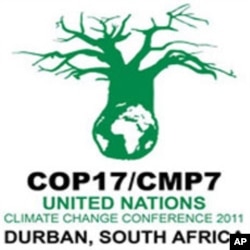This is Part 5 of a 5-part series: Climate Change
Continue to Parts: 1 / 2 / 3 / 4 / 5
A global summit on climate change is to begin in Durban, South Africa on Monday (November 28), but several leading scientists and environmentalists doubt the gathering will significantly advance the world’s response to global warming.
According to climatologists, higher temperatures worldwide are happening because power stations and factories continue to emit harmful substances, such as carbon dioxide, by burning coal for energy. The experts want all nations and especially the world’s leading polluters – including the United States, Europe, China and India – to commit in Durban to drastic reductions in so-called greenhouse gases.
“Most importantly we need the U.S. and China on board, because those two are responsible for 44 percent of the world’s carbon emissions. If a deal doesn’t include them, we’ll continue baking the planet,” said Tristan Taylor, climate change project coordinator at Earthlife Africa. “We also need particularly India, Brazil and South Africa to make that effort. We can get the U.S. and Europe on board, but if the big developing nations don’t make significant emissions reductions, we’ll be back to square one.”
If all countries don’t switch soon to producing clean power, such as energy generation from wind and the sun, environmentalists say the world will face a future filled with extreme weather events, such as droughts and floods, on an unprecedented scale. These would, they say, have terrible consequences, including global food shortages, economic and political upheaval and the spread of potentially fatal infectious diseases.
World leaders recognized the dangers of a warming planet in 1992, when they formulated the United Nations Framework Convention on Climate Change (UNFCCC). The parties to the convention meet annually, at gatherings known as Conferences of the Parties. Durban will be the scene of the 17th such meeting – COP 17.
No agreement
“We need a comprehensive, binding multilateral climate agreement but as things stand right now, Durban will not be the place where that is delivered,” said Tasneem Essop, international climate policy advocate for the Worldwide Fund for Nature.
Essop, a veteran of several COP meetings and a former provincial environment minister in South Africa, said there’s “no sign” that developed countries are ready to commit to “very ambitious” targets to reduce harmful emissions.
She added, “We would want to see developing countries ramping up their ambitions as well in terms of what they can do to reduce their emissions. We would also want to see large-scale international funding for actions taken by developing countries. We’ve seen none of this so far in build-up talks to Durban.”
Kevin Chika Urama, a Kenyan ecological economist, is the co-author of an internationally acclaimed study on the impacts of climate change on Africa. He insisted that “divine intervention” is needed to secure consensus in Durban. “If we don’t come up with a binding agreement, I will be very disappointed, because (it will mean) we are really playing games with something that is a game changer for the global economy, for the human race as a whole.”
Taylor stated, “My heart says yes, we should get a deal. My head says no, the countries are far too far apart.” Without advances on cutting carbon emissions, he said there’s a danger that COP 17 will do “more harm than good. You take a country like Mali. The COP that’s coming here to South Africa will probably produce more carbon in that month than the entire country of Mali does.”
Olivia Langhoff, campaign director for Greenpeace Africa, does not expect most countries to act in the interests of the world at COP 17. “Countries, specifically those that are intensive users of energy, are still playing their power games and bent on acting to serve their own narrow national self-interests,” she said. “And that means they’ll largely just continue to burn coal.”
Need for compromise
International talks to prepare for COP 17 have been fraught with tension and disagreements among several key players.
“I’ve been dismayed at all the finger-pointing,” said Lester Brown, one of the world’s top environmental scientists and president of the U.S. Earth Policy Institute. “The U.S. says, ‘We’re not going to do anything unless China and India do it.’ Then China and India say, ‘But you got to burn coal for 150 years to grow your economy; we also want to burn coal to develop our economies.’”
At this stage, said South African environmental researcher Taryn Pereira, COP 17 will fail because of “exactly this kind of vacuum of real leadership. Each country is kind of waiting and holding their cards close to their chest and saying, ‘Well, we’ll act (against climate change) if you’ll act.’”
Essop has also watched the “tit for tat” between certain countries with growing concern. “Constantly saying ‘We will not move unless someone else moves’…is not a constructive position to be in at this point in time,” she said.
She expressed sympathy for developing countries whose economies, with notable exceptions, have not benefited from coal burning and thus have not contributed much to climate change…but are now expected to abandon coal energy and to invest much of their GDPs in renewable power.
But, Essop added, the entire world will suffer if developing nations, in partnership with bigger, richer countries, don’t commit to seriously reducing greenhouse gas emissions. “They need to get out of their trenches and compromise, because everybody will need to compromise,” she emphasized.
Dan Ferber, a biologist and writer for the international scientific journal Science, added, “We can’t afford for countries all over the world to be burning coal for a hundred years like the developed world did; we just can’t afford it, the planet can’t afford it.”
Focus on U.S.
Pereira’s convinced that if just one major country takes a stand at COP 17 and pledges to go further than anyone else before with regard to cutting emissions of harmful substances, it’ll be a “giant leap forward” for the world. She said, “If someone is brave enough to do that, hopefully they will inspire and be a role model to other leaders.”
Urama said if this could be the U.S., it would be “a dream come true.”
But, judging from the past, said Essop, this is highly unlikely. In recent years Washington has been severely criticized for continually refusing to ratify the main current international agreement to fight climate change, the Kyoto Protocol, which was adopted at a COP meeting in Kyoto, Japan, in 1997 and came into effect in 2005. It commits countries that have ratified it to reducing their emissions of carbon dioxide and five other greenhouse gases.
“If the U.S. won’t even agree to Kyoto, which doesn’t go nearly far enough in pressuring countries to cut harmful emissions, then what hope is there that it will go even further in Durban?” asked Taylor.
Urama said, “We can’t win this war without the U.S. Despite all of its problems, it remains the dominant world power. It also happens to be the world’s leading polluter….”
But Brown is adamant that Washington’s refusal to ratify the Kyoto agreement should not be considered as overwhelming evidence that the U.S. is not committed to ensuring a cleaner world.
The scientist and environmental analyst told VOA, “The U.S. today has 492 coal-fired power plants. Seventy-one of those are now scheduled to close in the next few years. Most of those coal plants will be replaced by (power plants driven by) either wind or natural gas. Wind doesn’t have any carbon emissions; natural gas has carbon emissions that are half those of coal.”
Taylor acknowledged, “The U.S. is really pushing ahead with solar and thermal energy technology. Solar power plants in Arizona are already generating power on the same scales as coal-fired power stations.”
Brown insisted, “The U.S. needs to move faster and to further cut its use of coal but it’s headed in the right direction.”
Rather than the U.S. government being the chief catalyst for clean energy, he said it’s hundreds of American civil society groups who are successfully pushing to stop coal burning.
Langhoff said the rest of the world should learn from this. “The message to the people of the world is – don’t wait for governments to act. Governments often will not act unless there’s pressure on them. So citizens must wake up and start putting this pressure on their political leaders.”
‘Obsolete’ climate agreements
Brown thinks it’s unrealistic to expect COP 17 to deliver a deal that will see countries moving away from “dirty” energy. “My hopes and expectations (for that) are not very high because I do not think that internationally negotiated climate agreements are going to accomplish very much. My own sense is that they’re obsolete and we haven’t realized it yet,” he said.
Nevertheless, the former U.S. presidential advisor voiced confidence that a positive response to climate change by some of the world’s biggest polluters has begun, and that it will eventually spread around the globe – despite what happens, or doesn’t happen, at COP 17.
Brown, who’s been described by the Washington Post as “one of the world’s most influential thinkers,” emphasized, “We’re going to win this battle because individual governments decide they’re going to do certain things,” not because they’re under pressure from a legally binding international treaty.
He maintained that this scenario is already unfolding. He pointed out that China is currently investing massive amounts in the largest-ever wind power stations. “China is developing seven wind energy complexes of at least 10,000 megawatts each,” he explained. “The largest is 38,000 megawatts. When it is completed, it would generate enough electricity to satisfy the needs of a country like Poland, or Egypt, for example.”
To put China’s actions in context, Brown said the world’s biggest coal-fired energy stations are capable of generating a mere 5,000 megawatts, with the largest nuclear plants reaching 7,000 megawatts.
He said wind has already overtaken nuclear power as China’s primary source of energy, after coal.
Brown emphasized that the “rethink” about the ways in which the world will generate power in the future is not limited to the giant of the Far East.
“We’ve heard Prime Minister (David) Cameron in the United Kingdom saying Britain’s going to cut carbon emissions by 50 percent by 2025. And he didn’t say, ‘We’re only going to do this if the rest of the world does it.’”
The scientist continued, “The decline in carbon emissions in the U.S. is not something that was internationally negotiated. The U.S. is doing this because the American people have taken a stand against the coal-fired power plants that are harming the world and want them closed.”
No world ‘suicide’
But Greenpeace’s Olivia Langhoff insisted that the world is still moving far too slowly in implementing actions that will slow warming.
“There must be a global energy revolution, not a revolution limited to a few countries. Our analysis has shown how the world can transition from fossil fuel dependent energy supplies to a completely renewable energy supply by 2050. This is what is needed. It is feasible. The technology exists. All that is missing is political will,” she said, continuing, “But to make this deadline, we must move faster, and for that we need a global fund in place that will fund clean energy in countries that aren’t as rich as the U.S. and China.”
Brown urged developed countries not to use their respective financial crises as excuses to not move towards an international funding mechanism for renewable energy.
Langhoff is one of several skeptics who have written COP 17 off as a mere talk-shop, but who remains confident that the world will eventually respond to the immense challenges posed by climate change.
“I feel optimistic that big steps forward will be taken soon. I say this because the entire humanity is on a precipice and I don’t believe it wants to commit suicide,” she commented. “We have never been in a situation like this before where the survival of the whole world is threatened. My sense therefore tells me that the world’s people and their leaders are realizing this and are beginning to unite to fight this threat off.”
Another critic of COP 17, Earthlife’s Tristan Taylor, said, “COP 17 may not achieve anything significant, but eventually the pressure will start to tell on world leaders and they will have to act decisively. People across the globe are becoming impatient. As a result of increased advocacy and awareness around climate change, world citizens are beginning to realize that their futures, and in some cases their lives, are at stake.”
















